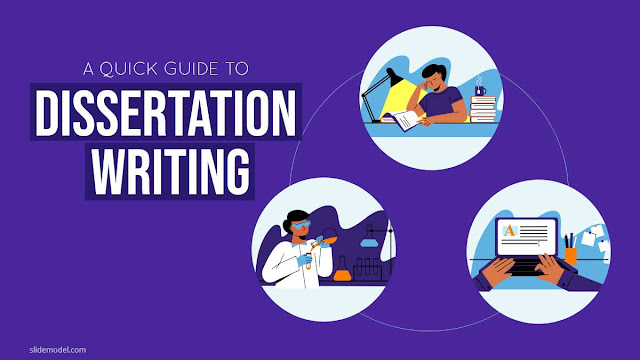Saturday, 25 March 2023
FAQs - Dissertation Writing
Wednesday, 15 February 2023
Dissertation Writing
Research Project Writing: Dissertation Writing
The learning objectives for writing a dissertation can be organized using Bloom's Taxonomy, which categorizes educational goals into six levels:
1. Remembering: recall relevant information from memory, such as key concepts and theories related to the dissertation topic.
2. Understanding: comprehend the meaning of the information and how it relates to the dissertation topic.
3. Applying: use the information to solve problems or make decisions relevant to the dissertation topic.
4. Analyzing: break down the information into component parts and understand how they relate to each other and to the dissertation topic as a whole.
5. Evaluating: make judgments about the value or quality of the information and its relevance to the dissertation topic.
6. Creating: use the information to generate new ideas, designs or theories related to the dissertation topic.
For example, a dissertation on the impact of social media on political participation, the learning objectives could be:
1. Remembering key theories of political participation
2. Understanding how social media affects political participation
3. Applying data analysis techniques to study the relationship between social media and political participation
4. Analyzing the impact of social media on different groups' political participation
5. Evaluating the strengths and limitations of existing studies on the topic
6. Creating new hypotheses or theories about the relationship between social media and political participation.
For more examples, visit study material website > https://sites.google.com/view/maengmkbu2020/
Description
Marks: 70 | Hours: 60 | Credit - 4
The dissertation of 75 to 100 pages or 20,000 to 25,000 words shall be submitted to the University.
The format of writing dissertation shall be as given below:
Font Size: 16 - Main Title of the Chapter > 14 Sub-titles within the chapter > 12 for main content.
Line Space: 1.5 line space.
Print: On both sides of the pages
Bind: Spiral
The dissertation shall be approved by the Department teacher/s and duly forwarded through the Head of the Department.
The evaluation of the dissertations shall be done by internal and external examiners similar to that of answer books of MA – English programme.
Internal evaluation in form of presentation shall be carried out at the Department in presence of the Head of the Department and/or concerned teacher / supervisor.
Continuous Internal Evaluation
Presentation - 25 Marks
Seminar / attendance - 05 Marks
Written Test - 00 Marks
Note:
Integration of ICT for blog, presentation, video resources will be integral part of CIA. All works produced by the students for internal evaluation shall be presented as digital portfolio.
1. Remember: Students will be able to recall key concepts, theories, and research methods related to dissertation writing.
2. Understand: Students will be able to explain the purpose and significance of their research topic, as well as the research methods they plan to use.
3. Apply: Students will be able to use appropriate research methods to collect and analyze data for their dissertation.
4. Analyze: Students will be able to critically evaluate and interpret their data, and integrate it with existing literature to make original conclusions and recommendations.
5. Evaluate: Students will be able to assess the limitations and implications of their research, and consider potential future directions for further study.
6. Create: Students will be able to compose a well-written, coherent dissertation that effectively communicates their research findings and conclusions.
These course-specific learning outcomes focus on the cognitive process of dissertation writing and how students will be able to demonstrate their understanding of the subject matter, and the skills they've acquired by the end of the course.

